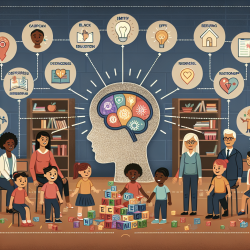Introduction
Social-Emotional Learning (SEL) has become a pivotal component in educational settings, emphasizing the importance of emotional regulation and wellbeing for academic success. The research article "Fundamental Themes in Social–Emotional Learning: A Theoretical Framework for Inclusivity" by Dussault et al. (2024) provides a comprehensive framework that seeks to clarify SEL concepts and promote inclusivity in educational practices.
The Need for a Unified Framework
The research highlights the necessity of a unified framework to address the confusion surrounding SEL terminology and implementation. With over 136 frameworks and 700 SEL-related competencies, the lack of clarity hinders the effective integration of SEL programs across different contexts, such as education, mental health, and community settings.
Key Components of the Framework
The framework proposed by Dussault et al. identifies five core competencies that form the basis of SEL:
- Self-Regulation: The ability to control one's behavior and emotions in contextually appropriate ways.
- Critical Thinking: The capacity to objectively analyze and evaluate information for decision-making.
- Self-Motivation: The drive to pursue goals and complete tasks independently.
- Compassion: Recognizing and alleviating the dysregulation of others.
- Collaboration: Working effectively with others towards common goals.
Implications for Practitioners
For practitioners, this framework provides a roadmap to assess and enhance SEL competencies in children. By understanding the hierarchical nature of these competencies, educators can tailor interventions to address foundational skills before progressing to more complex social-emotional abilities.
Encouraging Further Research
While the framework offers a robust foundation, it also invites further research to explore the application of SEL across diverse cultural and environmental contexts. Practitioners are encouraged to engage with the framework to identify gaps in current SEL programs and contribute to the development of more inclusive and effective practices.
Conclusion
The research by Dussault et al. underscores the critical role of SEL in fostering inclusive educational environments. By adopting a unified framework, educators can better support the social-emotional development of children, ultimately leading to improved academic and personal outcomes.
To read the original research paper, please follow this link: Fundamental Themes in Social–Emotional Learning: A Theoretical Framework for Inclusivity.










